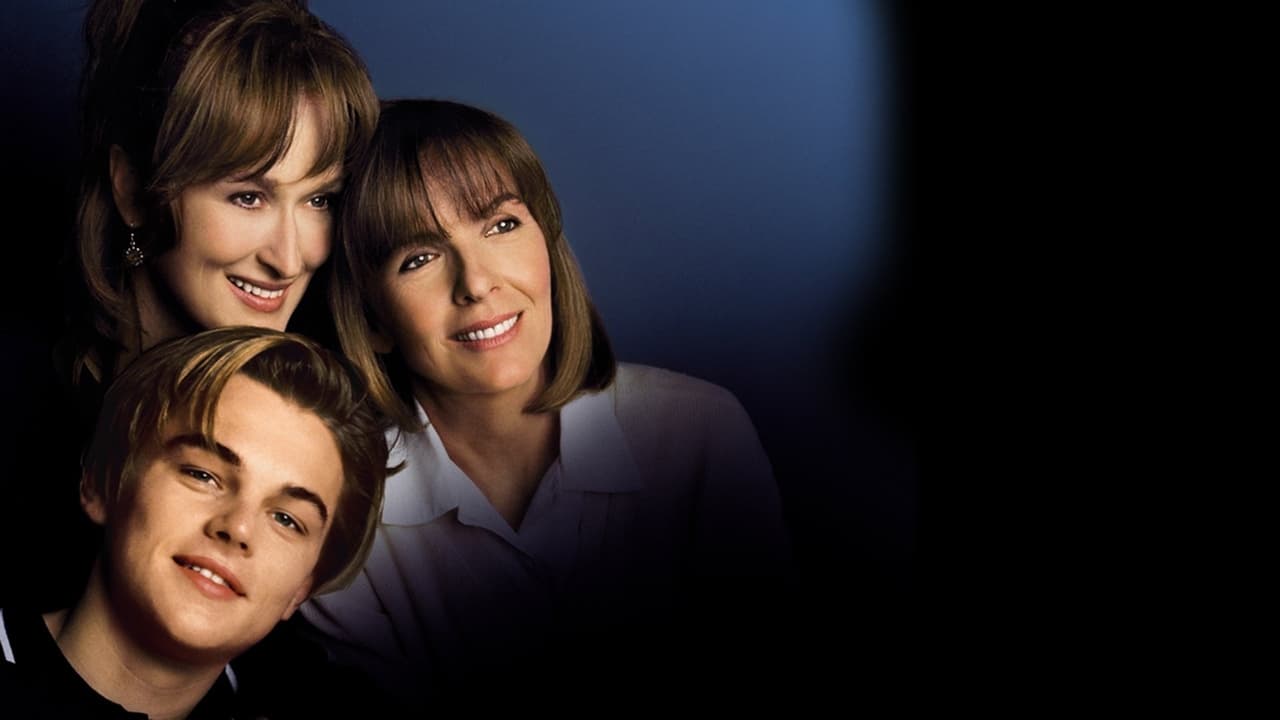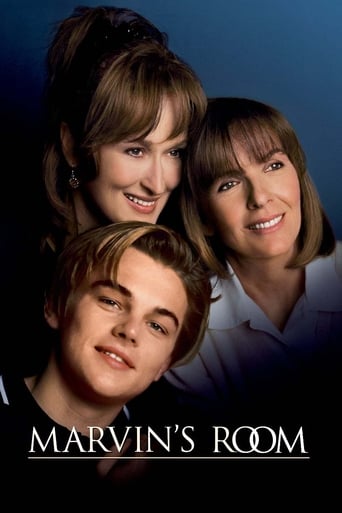TrueJoshNight
Truly Dreadful Film
Sharkflei
Your blood may run cold, but you now find yourself pinioned to the story.
Bluebell Alcock
Ok... Let's be honest. It cannot be the best movie but is quite enjoyable. The movie has the potential to develop a great plot for future movies
Logan Dodd
There is definitely an excellent idea hidden in the background of the film. Unfortunately, it's difficult to find it.
Sober-Friend
If you want to see a great actors do a bad job then watch this film. Hume Cronyn one of Americas greatest actors should have been told toned his performance. He was so bad in this that Diane Keaton looked so good that she got an Academy Award Nomination. The best thing about this film however is Meryl Streep who once again proves she is the greatest.In this film A leukemia patient attempts to end a 20-year feud with her sister to get her bone marrow.The film is okay to watch but Hume is so bad that it sinks the entire thing
MartinHafer
If you are looking for a feel-good film or something nice, do NOT watch "Marvin's Room". It's incredibly depressing and awful--sort of like watching the life of Job as every possible awful thing happens to poor, sweet Bessie in the picture. It's so bad that at times I felt like cringing as I watched the film.Here's the low-down in this god-awful film. Bessie (Diane Keaton) is the sole caretaker for her father, Marvin (Hume Cronyn), who has been bedridden, brain damaged and unable to talk after a stroke which occurred many, many years ago. Bessie is also the caretaker for her mentally ill and wacky Aunt Ruth (Gwen Verdon). Bessie is a selfless and nice person but she has no life apart from these two. Now, she's just learned that she has Leukemia and may die unless she gets a bone marrow transplant.Bessie's sister, Lee (Meryl Streep) is a selfish train wreck. She's clueless, self-absorbed and a horrible person. She never offered Bessie any help in caring for these sick people and they haven't spoken in nearly two decades--and expecting any change in this is very unrealistic. Not surprisingly, her oldest son, Hank (Leonardo DiCaprio) is seriously disturbed...however, he's SO disturbed that when the film begins, he deliberately burns their house to the ground. As a result, he's committed to a mental institution. There is a much younger son- -an oblivious lost soul.It turns out that there's trouble finding a bone marrow match for Bessie and she has to rely on her sister and her family. Lee takes Hank out of the mental hospital to which he's been committed in order to take him cross country to see if he is a match. She DOESN'T tell Hank this and based on Hank's seriously disturbed and crazy behaviors, it sure ain't likely that he'll agree when he finds out the truth. Now, this incredibly sick group of weirdos are all brought into the same home and the viewer is wondering what the heck sort of awfulness will happen next.The acting is fine in this film. In addition to the folks I mentioned, Robert De Niro is also in the film...but with all the craziness he does get a bit lost. That's because the script is just too much--too much craziness and the ending is WAY too much because it makes little sense. It is also so painful to watch and if you come from a rather dysfunctional background, it might really scare you away or remind you of your own issues (for good or bad..but probably bad). And, many of us watch movies to escape--not to feel unpleasant. I myself used to be a family and individual therapist--and the film just reminded me of the worst of the clients I worked with...and that wasn't altogether welcome. Plus how satisfying can it be to sit and watch this long train wreck?! And realistic can an ending be where, miraculously, the problems seemingly just vanish?!Hard to watch, hard to love. I can see why this wasn't a big money- maker when it debuted.
mark.waltz
There is going to be subtle debate for years as to which leading lady steals this film-Golden Globe Nominee Meryl Streep or Oscar Nominee Diane Keaton, playing unlikely sisters reunited after a long estrangement when Keaton discovers that she has leukemia and may need bone marrow. Streep vanished years before in order to prevent herself from being trapped by taking care of their ailing dad (Hume Cronyn), now bedridden, and suffering from all sorts of malady's including obvious dementia. All he does is groan and mumble, making this a very difficult role to watch the beloved Broadway veteran play.Cronyn's "Cocoon" co-star, Broadway musical diva Gwen Verdon, steals every moment in which she is on screen as his equally ailing sister who has a mechanism implanted in her hip which causes the garage door to either open or close every time she twists it. She's a soap addict who wears a fur and tiara to the wedding of her two favorite characters, played by "All My Children's" Kelly Ripa and John Callahan. Ironically, "All My Children" was the only soap on which Verdon ever appeared. Streep's youngest kid, a bespeckled geek, shows an eerie talent for applying make-up as he prepares Verdon for "the wedding" with subtle hints of what he will grow up to be.The oldest son, Leonardo DiCaprio, obviously despises his mother, and probably for good reason. Streep plays one of her most unsympathetic characters, and at times, doesn't fully seem comfortable playing this role. Even though she's a cosmetology student and very capable as to what she does, she's far too messed up emotionally to always look so physically well put together. Of course, the character is hiding behind a facade of bitterness, so as Streep pulls away these layers, the character becomes a bit more tolerable even though she's often inconsistent.Getting away from the "La Dee Da" attitudes she's inhibited in most of the roles she's played since "Annie Hall", Diane Keaton for me make the film pull out its heart. She has given up her own life and romantic possibilities in order to take care of the pathetic Cronyn (who by the way they talk about him should have died years ago) and the dizzy Verdon, and it is obvious from the time she meets the troubled pyromaniac DiCaprio she wants to make up for lost time in getting to know her nephew. When he angrily smacks her hand away from his face during a light caress, you can see her invisible tears flowing, and it is heartbreaking. However, joy takes over when they bond with a wild ride on the beach, and even the lost child DiCaprio plays seems to return to humanity as his heart opens to the aunt he hadn't met until recently.DiCaprio is a tough nut to crack here, showing an iron shield for long periods of time interrupted by the bleeding little boy inside, not understanding the resentments of his maternal family and aching for his unseen father, a race car driver who abandoned his mother years before. So while this is a very tough film to like, especially when it interrupts the family drama with the presence of the befuddled doctor played by Robert DeNiro, and his idiotic brother (Dan Heydara) who works as his receptionist (after the regular receptionists resigns simply by typing a note which says "I Quit!"), there's some truth in its dissection of the fall of families over the past few decades and how dysfunctions of earlier generations can carry on to the next.
eschetic-2
Small cast, intimate dramas like MARVIN'S ROOM, NIGHT MOTHER or STEEL MAGNOLIAS are among the hardest to adapt from the confines of the stage where the imagination can open the plays ideas up and make what might seem maudlin, real and life affirming to the more realistic form of film where it is harder to see beyond the mundane "bed pan" realities of life. In order to reinvent the best of these - like the plays mentioned above - to the new genre, every break is needed starting with bravura casts who, one hopes, an audience will want to see even "reading the phone book." When a play turns around the characters dealing literally with confrontations with death at the core of the plot as in these three great plays, what HAD been on stage a single set intense evening is frequently "opened up" with all sorts of other locations and events almost as if to distract us from the very issues which we are supposed to be attending to.On stage and screen MARVIN'S ROOM may well be the best of these three "death plays," all of which started and thrived Off-Broadway (only NIGHT MOTHER made the leap to a Broadway house in its initial production). While, somewhat amazingly (considering that one of the standards of the award is "depiction of American life"), MARVIN'S ROOM was not even a finalist for the Pulitzer Prize for Drama in 1992, it did win a number of other accolades which virtually demanded that Hollywood attempt to bring it to the rest of the nation - and they certainly gave it their all starting with the genuinely all star cast which is both the movie's blessing and its curse. It enraptures with the bouquet of bravura performances even while moving focus away from the central "earth-mother" of the family forced to face her own mortality while trying to care for and hold her collapsing family together around her (Diane Keaton's Oscar nomination - the film's only - notwithstanding).Ultimately, the film gets where the play was going (as well it ought to have, since Scott McPherson had the luxury of adapting his own play - he may have written his screenplay simultaneously with, if not before the tighter stage version, since he died in 1992, the year MARVIN'S ROOM received its Off-Broadway production at Playwrights' Horizons, winning the Outer Critics' Circle and Drama Desk Awards as best Play of the Year), but the power seems to have shifted from the play's revelations themselves to the dazzling performances. It's still well worth taking the trip, but more to appreciate a monument to more than a dozen brilliant stage and screen careers than a revelatory experience on the meaning of humanity in the face of life and death that the play had been.Do, by all means see the movie. It works. ...but if you ever get a chance to see the play which either suggested it or grew from it, by all means do - it's smaller but even better.

